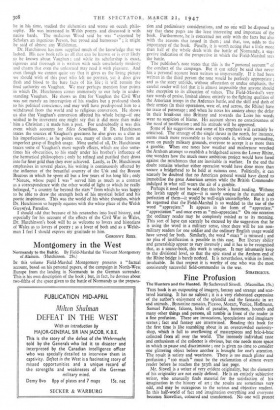Montgomery in the West
IN this volume Field-Marshal Montgomery presents a " factual account, based on his personal papers, of the campaign in North-West Europe from the landing in Normandy to the German surrender. This is his own description of the book ; but, in fact, he devotes about two-fifths of the space given to the battle of Normandy to the prepara-
tion and preliminary considerations, and no one will be disposed to say that these pages are the least interesting and important of the book. Furthermore, he is concerned not only with the facts but also with the reasons that issued in them ; and that, too, adds to the importance of the book. Finally, it is worth noting that a little more than half of the whole deals with the battle of Normandy, a sug- gestive indication of the perspective in which the Field-Marshal sees the battle.
The publisher's note states that this is the " personal account " of the conduct of the campaign. But it can safely be said that never has a personal account been written so impersonally. If it had been written in the third person the tone would be perfectly appropriate ; and as the story unfolds, without affectation or undue emphasis, the careful reader will feel that it is almost impossible that anyone should take exception to its allocation of values. The Field-Marshal's very rare words of praise, limited almost entirely to the fighting qualities of the American troops in the Ardennes battle, and the skill and dash of their armies (in their operations, west of, and across, the Rhine) have no trace of patronage ; and when he notes his anxiety about the delay in their break-out into Brittany and towards the Loire his words wear no suspicion of blame. His account shows no consciousness of the need of justification ; and his attitude will be approved. Some of his suggestions and some of his emphasis will certainly b.: criticised. The strategy of the single thrust in the north, for instance, seems much more reasonable as he expounds it, without persuading, even on purely military grounds, everyone to accept it as more than a gamble. When one notes how weather and misfortune wrecked the Arnhem attempt to establish a bridgehead across the Lower Rhine, one wonders how the much more ambitious project would have fared against the mischances that are inevitable in warfare. In the end the doubt remains whether either operation would have done more than secure a bridgehead to be held at ruinous cost. Politically, it can scarcely be doubted that no American general would have dared to immobilise the great American armies while the British Commander indulged in what still wears the air of a gamble. _
Perhaps it need not be said that this book is hard reading. Without the lavish supply of maps—it is surely unique in the number and perfection of them—it would be well-nigh unintellifeble. But it is to be regretted that the Field-Marshal is so wedded to the use of the word " appreciate." It appears in the form of "appreciate," " appreciation " and once even as " mis-appreciate." On one occasion the ordinary reader may be completely misled as to its meaning. This sort of lapse can scarcely be excused by the suggestion that he is using the word in a military sense, since there will be ten non- military readers for one soldier and the ordinary English usage would have served for both. Similarly, the word " exact " is misused ; and no plea of justification is possible in this case. But literary ability and generalship appear to vary inversely ; and it has to be recognised that, as a source-book, this work is unique. It may inhumanly keep to the divisional level, so that the epic stand at the Arnhem end of the Rhine bridge is barely noticed. It is nevertheless, within its limits, invaluable. In that respect it is worthy of one who was the most consistently successful field-commander in the war.
STRATEGICUS.


































 Previous page
Previous page